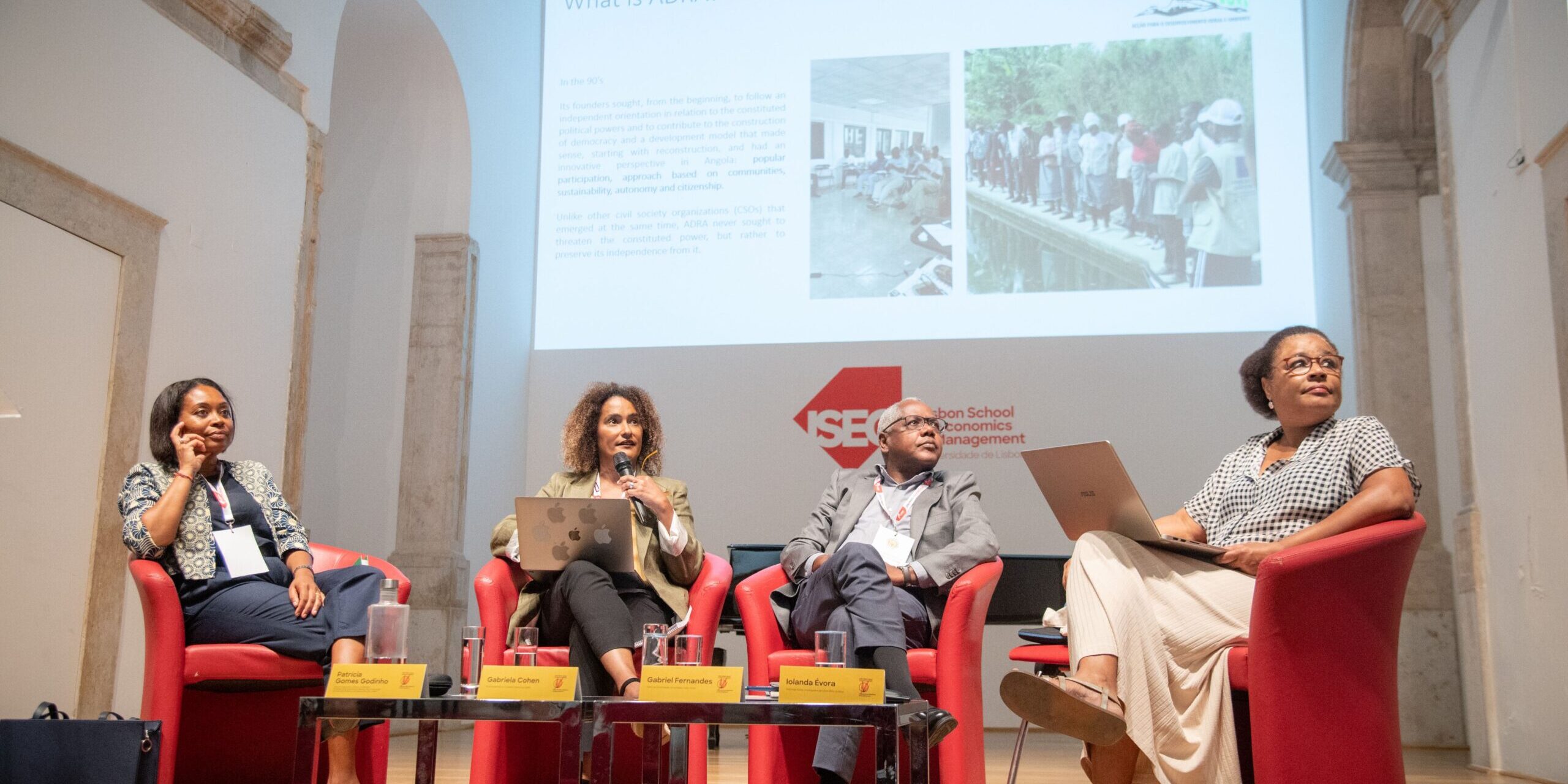CESA
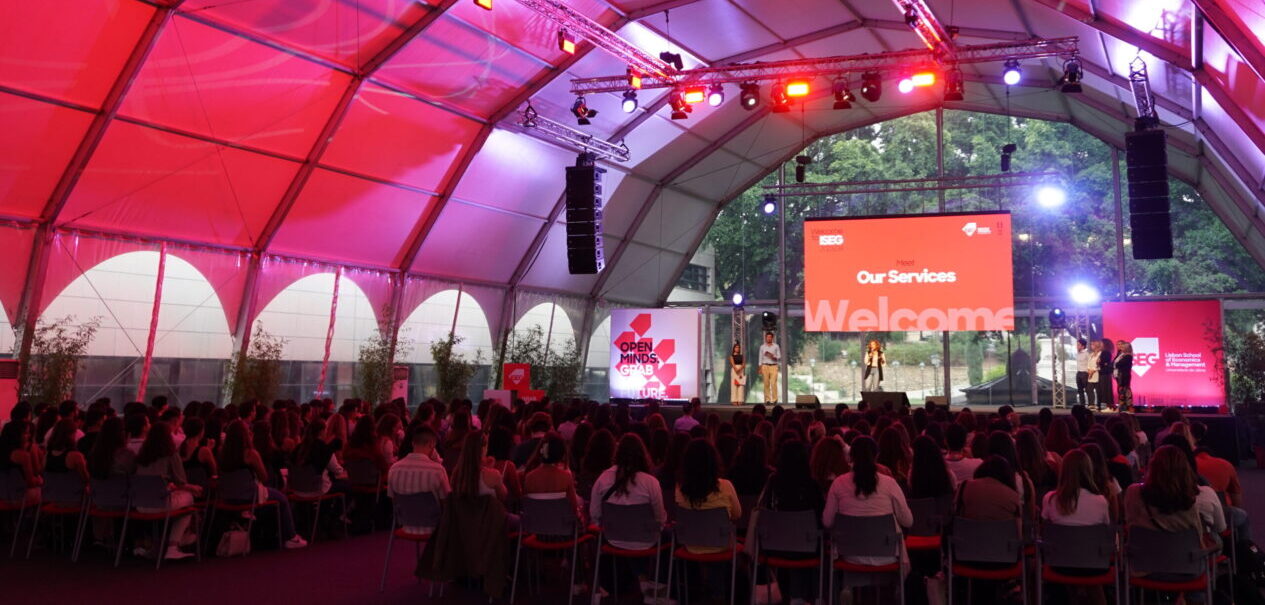
CEsA welcomes candidates for the Master’s in Development and International Cooperation and PhD in Development Studies for the 2023/2024 semester at ISEG

This September, CEsA – Centre for African and Development Studies (CEsA/CSG/ISEG/ULisboa) has joined ISEG – Lisbon School of Economics and Management (ULisboa) to welcome candidates for the Master’s in Development and International Cooperation (MDCI) and the PhD in Development Studies (PDED) for the 2023/2024 Semester.
The MDCI Welcome Session took place on September 6, 2023, at Pátio das Francesinhas, with a presentation by Tuna Económicas, with a speech by the Presidente of ISEG, Professor João Duque, and an Inaugural Lecture given by the President of CEsA, Professor Eduardo Moraes Sarmento. The PDED Inaugural Lecture took place on September 19, 2023, in the IAPMEI Room, in the Quelhas Building, at ISEG, given by Professor Francisco Louçã, with the participation of the Vice-President of CEsA, Professor Jessica Falconi.
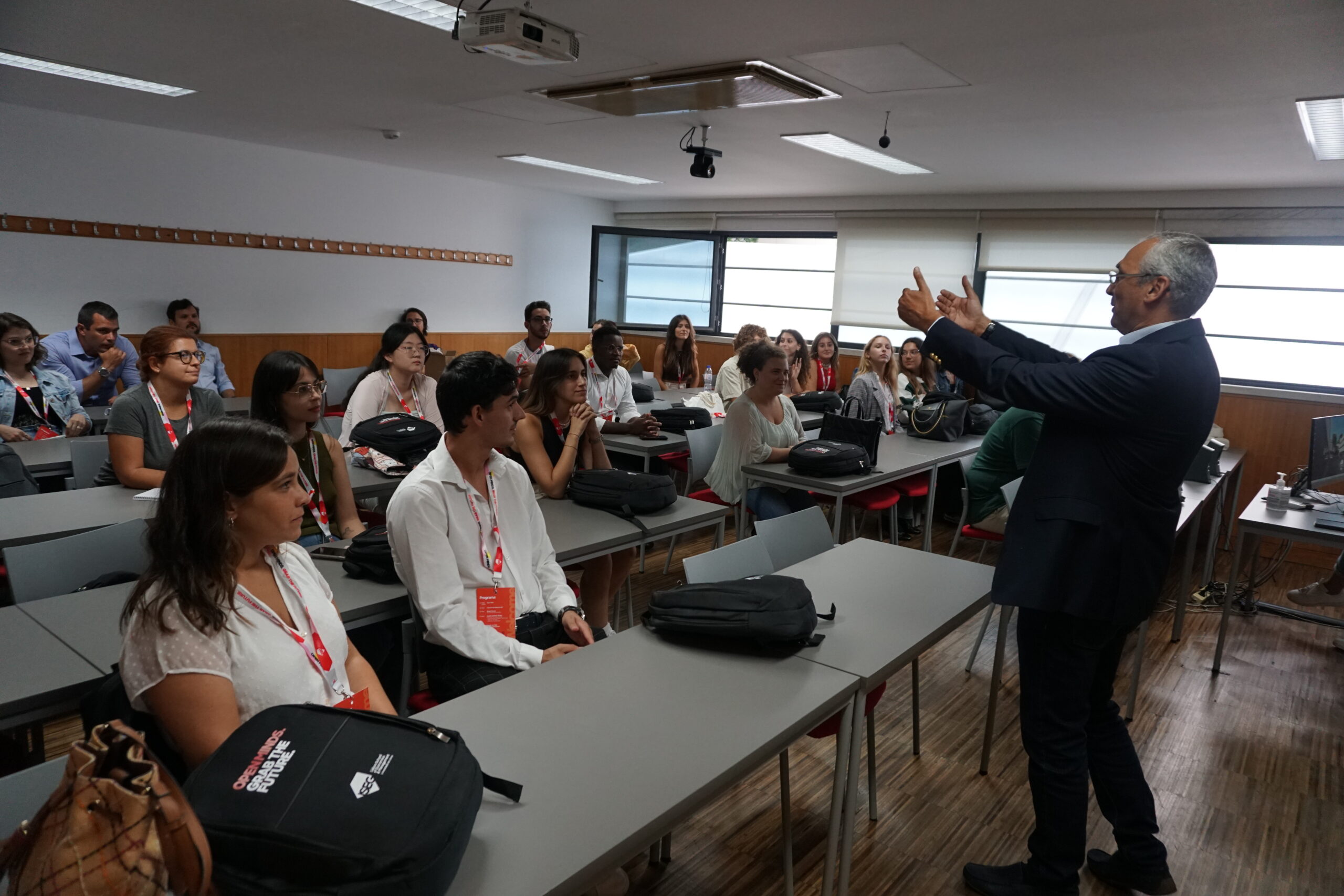
On these occasions, the CEsA Board had the opportunity to introduce students to one of the oldest research centres in Portugal dedicated to Development Studies and invite them to learn about the research and science communication work and follow the main dissemination channels of CEsA, such as the website, newsletter, YouTube channel and pages on Facebook and LinkedIn.
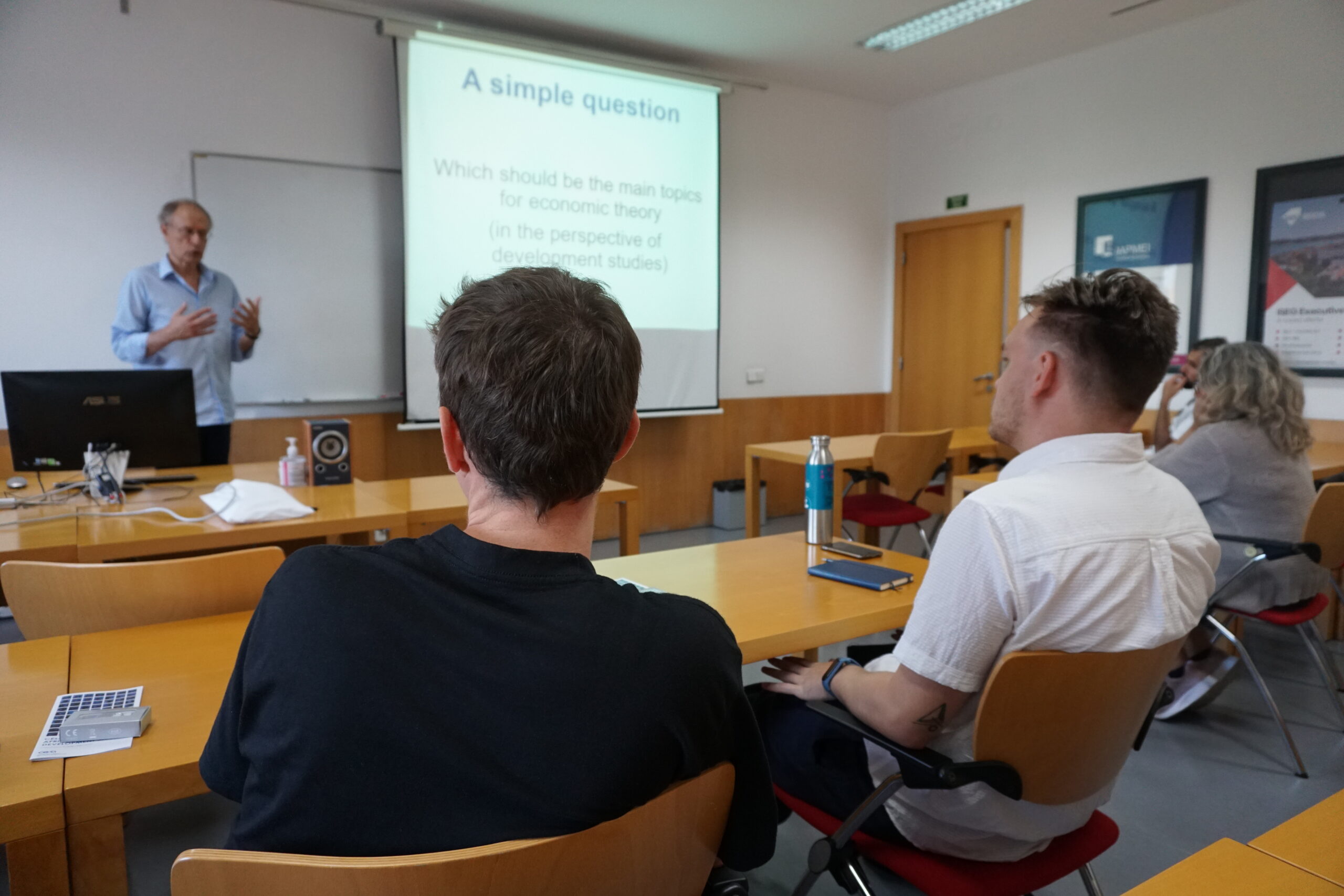
Read/See more:
Master’s in Development and International Cooperation – ISEG
PhD Programme in Development Studies – ISEG
Author: CEsA Communications (comunicacao@cesa.iseg.ulisboa.pt)
Images: Marianna Rios/CEsA/CSG/ISEG/ULisboa
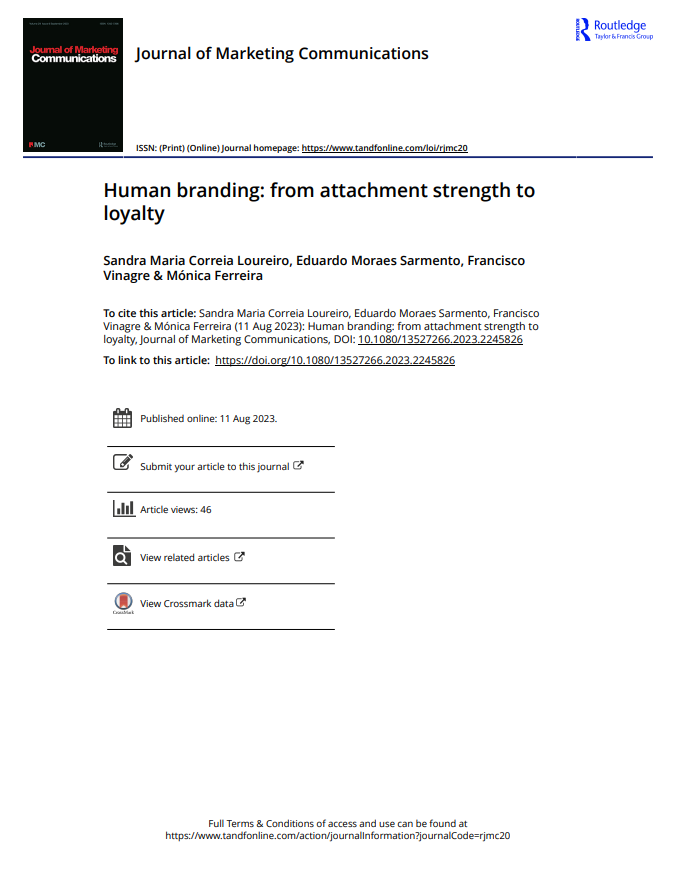
Human Branding: From attachment strength to loyalty
Abstract:
Human branding is everywhere and within every individual. With the increase in the importance of technology and social media, human branding becomes increasingly relevant, but it is still a branding concept with much room to explore. Celebrities, such as actors and athletes, are the greatest examples of human brands, and with social media managing public image is key to success. This study aims to analyze the process by which attachment strength influences loyalty through intimate and public engagement. Thus, a sample of 321 participants, collected through social media platforms, allowed us to treat data and test the hypotheses of the proposed model. Relatedness is the most relevant driver of attachment strength and the flow from attachment to loyalty through public engagement.
Quotation:
Loureiro, Sandra Maria Correia … [et al.] (2023) “Human Branding: From attachment strength to loyalty”. Journal of Marketing Communications, DOI: 10.1080/13527266.2023.2245826
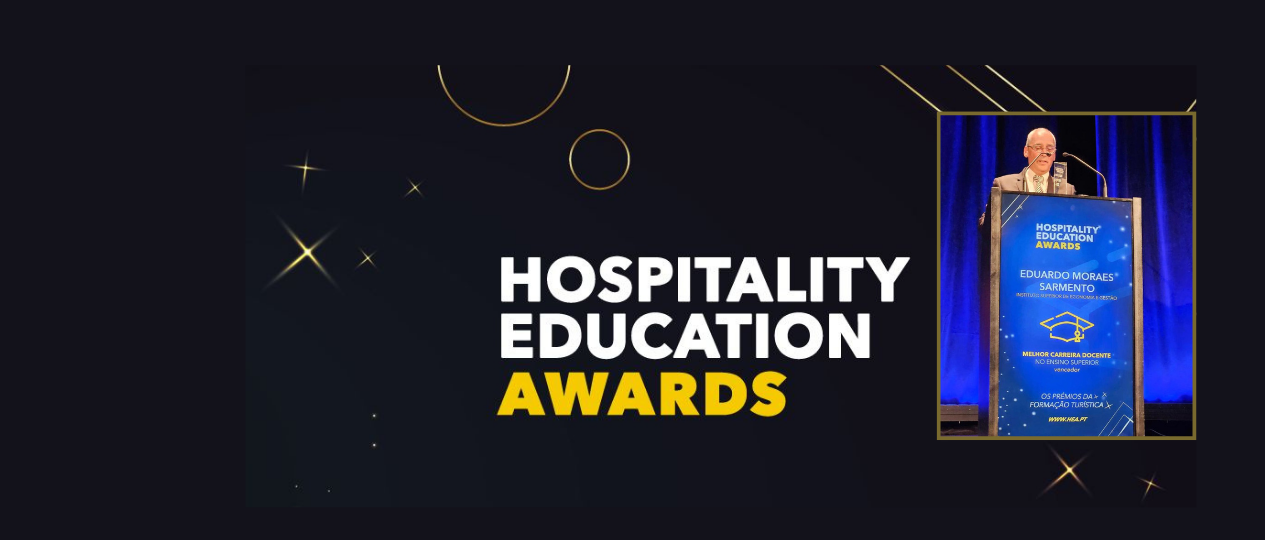
Eduardo Moraes Sarmento wins the Hospitality Education Awards 2023 in the Best Higher Education Lecturer in Tourism category
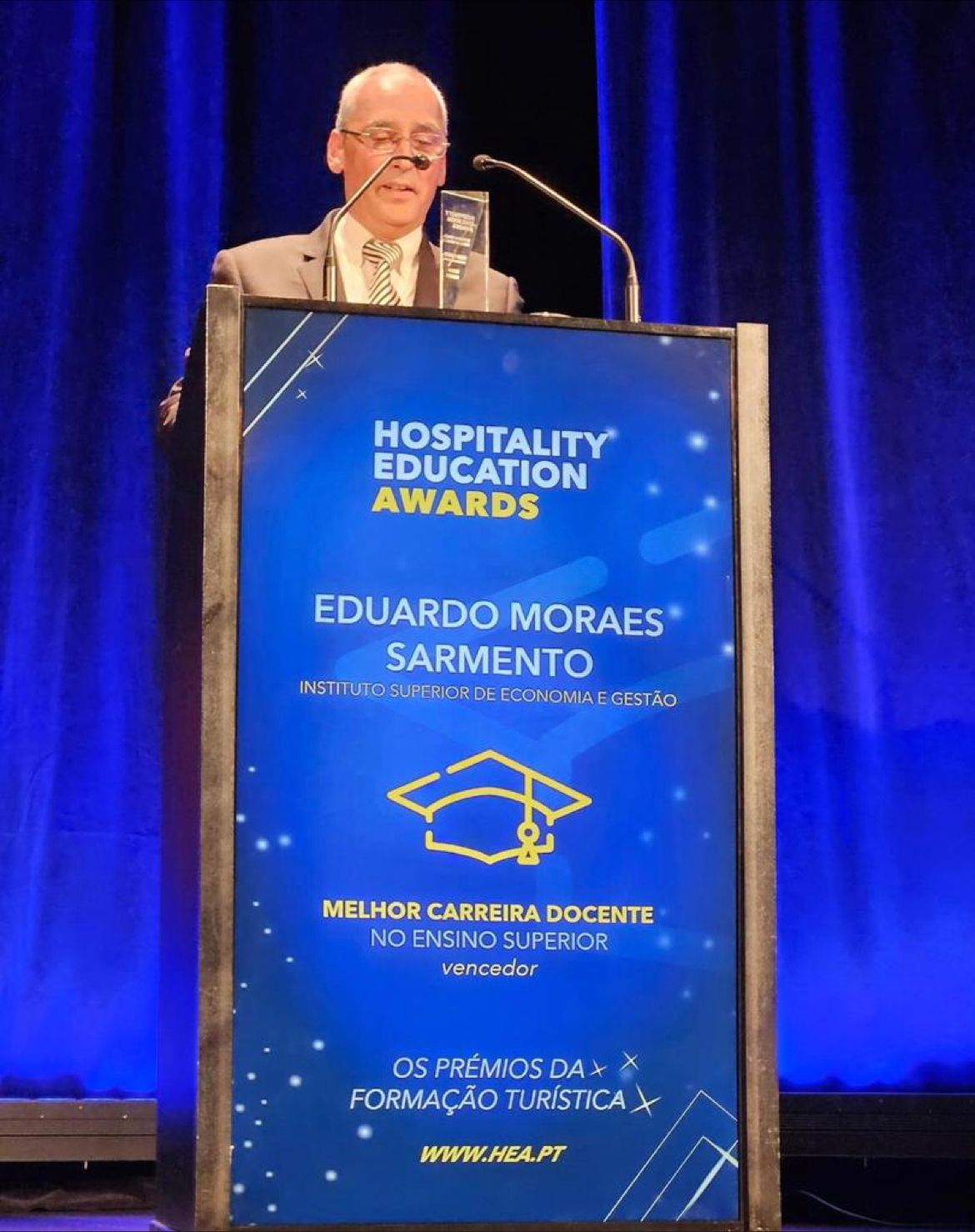
CEsA (CSG/ISEG/ULisboa) researcher and director, and lecturer at the Lisbon School of Economics and Management (ISEG/ULisboa), Professor Doctor Eduardo Moraes Sarmento, was distinguished with the Hospitality Education Awards 2023, in the Best Higher Education Lecturer in Tourism category. Congratulations on this achievement!
“It is an honor to be here with you on this special day, especially because of my life journey. Teaching is a passion. I left business for teaching, and the passion has to be followed. This is a permanent exchange: we teach, but we are constantly learning. It’s something beautiful and, honestly, I feel very humble to be here today”, said Sarmento after receiving the award in a ceremony that took place on September 19, 2023, at the Museu do Oriente, in Lisbon.
About the prize
The Hospitality Education Awards are dedicated to distinguishing tourism education in Portugal and recognizing and publicizing projects and professionals that have a positive impact on the sector. The category in question “recognizes the academic and professional career of a higher education lecturer in tourism and hospitality”.
The award is an initiative of the Associação Fórum Turismo in partnership with Turismo de Portugal, I.P, the National Association of Professional Schools (ANESPO), the Institute of Employment and Professional Training (IEFP) and the Network of Public Higher Education Institutions with Courses in the area of Tourism (RIPTUR).
Projects and professionals were distinguished in seven categories, as follows:
Best Educational Project: Events Team (Winner)
Best Innovation Project: MAC – Museu de Alga Comestível (Winner)
Best Professional Education Lecturer: Eduardo Lomba Vicente (Winner)
Best Higher Education Lecturer: Eduardo Moraes Sarmento (Winner)
Best Stakeholder: MINOR Hotels (Winner)
Best Young Career: Rodrigo Madeira (Winner)
Forum Tourism Award: Acácio Ferreira Duarte (Winner)
More information on the award website: https://hea.pt/
About Eduardo Moraes Sarmento
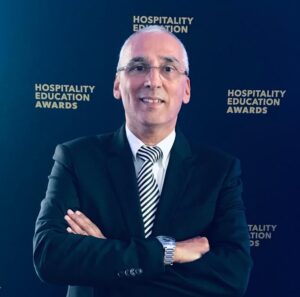
He is a lecturer at the Instituto Superior de Economia e Gestão (ISEG) and an integrated researcher at CEsA/CSG/ISEG/ULisboa. He took his Aggregation exams at the University of Aveiro in Management with specialisation in Tourism. He has a PhD in Economics with specialization in Tourism from ISEG/ULisboa. He has published several books: from Statistics to Scientific Methodology and also on issues related to the Sustainable Development process of small island economies. He has participated assiduously in several scientific events (seminars and conferences) abroad and in Portugal mainly related to Economics, Marketing and Tourism. She has scientific competencies especially in the area of Economics and Tourism. He teaches several curricular units in the 1st, 2nd and 3rd cycle. He has coordinated numerous MSc and PhD dissertations in public and private university institutions. He has been invited by the main university institutions to be the author of dissertations and theses. He has participated in international research projects by CEsA/CSG/ISEG/ULisboa and other Institutions in Portugal, Russia, Ukraine, Greece, Czech Republic and Cape Verde. In scientific terms he has dozens of international and national articles published abroad in renowned scientific journals especially in the areas of tourism marketing and sustainable development and the effects of tourism on the economy as a development tool. At the same time he is an international consultant having participated in several projects for the Government of Cape Verde and in the study of the location of the new Lisbon airport among many others.
Further details can be consulted in his research profile on our website: https://cesa.rc.iseg.ulisboa.pt/investigacao/investigadores/esarmento/
Get to know Eduardo Moraes Sarmento scientific production: https://www.repository.utl.pt/browse?type=author&value=Sarmento%2C+Eduardo+Moraes
Read more:
Eduardo Sarmento is elected director of CEsA; Jessica Falconi and Alexandre Abreu, sub-directors
Author: CEsA Communication (comunicacao@cesa.iseg.ulisboa.pt)
Image: CEsA/Reproduction
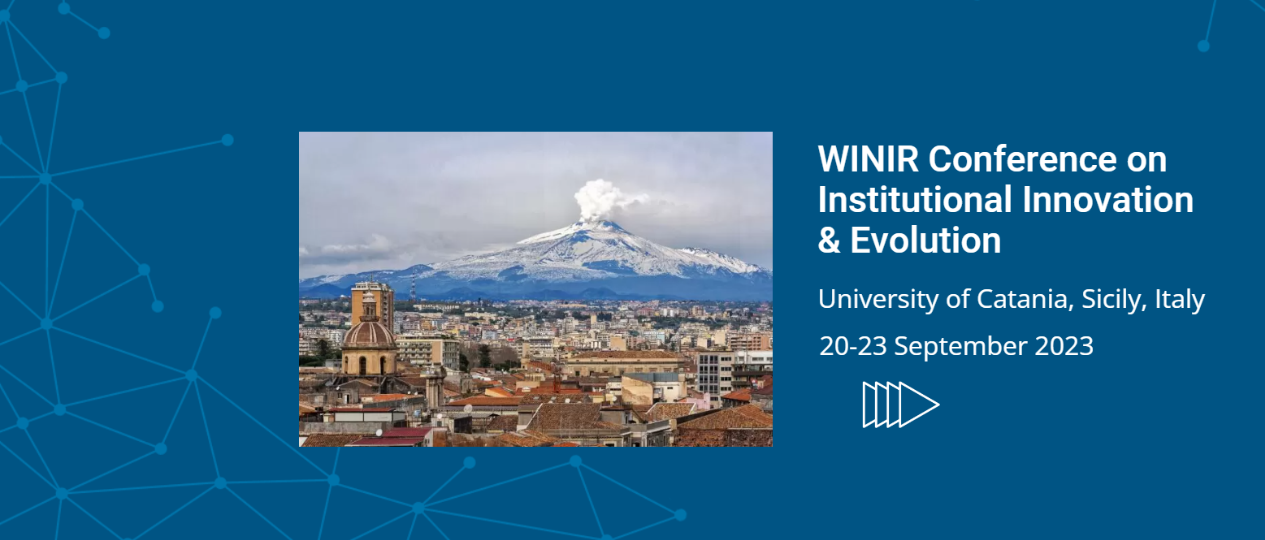
CEsA researcher Luís Pais Bernardo presents a paper on regional development banks at the 8th WINIR Conference in Italy

CEsA researcher Luís Pais Bernardo (CEsA/CSG/ISEG/ULisboa) will present the article “Regional Development Banks and Private Sector Development Units” on September 21, 2023 at the 8th WINIR Conference – Institutional Innovation and Evolution Challenges to the Modern World Order, at University of Catania, Sicily, Italy. The paper will be presented within the scope of Session S4.4 – Industrial Policy, Room 4, Monastero dei Benedettini. The program can be checked out on the Conference website: https://winir.org/winir-2023-programme/
About our researcher
 Completed the Master in Comparative Politics in 2009 by the Institute of Social Sciences, University of Lisbon, Degree in History in 2007 by the Universidade Nova de Lisboa Faculty of Social and Human Sciences and Doctor (PhD) in Sociology on 2018/01/17 by Humboldt- Universität zu Berlin Institut für Sozialwissenschaften. He has published 6 articles in specialized journals. He owns 2 book(s). He works in the areas of Social Sciences with an emphasis on Political Science. In his professional activities he interacted with 17 collaborators in co-authorship of scientific works.
Completed the Master in Comparative Politics in 2009 by the Institute of Social Sciences, University of Lisbon, Degree in History in 2007 by the Universidade Nova de Lisboa Faculty of Social and Human Sciences and Doctor (PhD) in Sociology on 2018/01/17 by Humboldt- Universität zu Berlin Institut für Sozialwissenschaften. He has published 6 articles in specialized journals. He owns 2 book(s). He works in the areas of Social Sciences with an emphasis on Political Science. In his professional activities he interacted with 17 collaborators in co-authorship of scientific works.
More information on Luís Pais Bernardo research profile: https://cesa.rc.iseg.ulisboa.pt/investigacao/investigadores/lbernardo/
Get to know more about Luís Pais Bernardo scientific production: https://www.repository.utl.pt/browse?type=author&value=Bernardo%2C+Lu%C3%ADs+Pais
Author: CEsA Communication Team (comunicacao@cesa.iseg.ulisboa.pt)
Image: WINIR/Reproduction
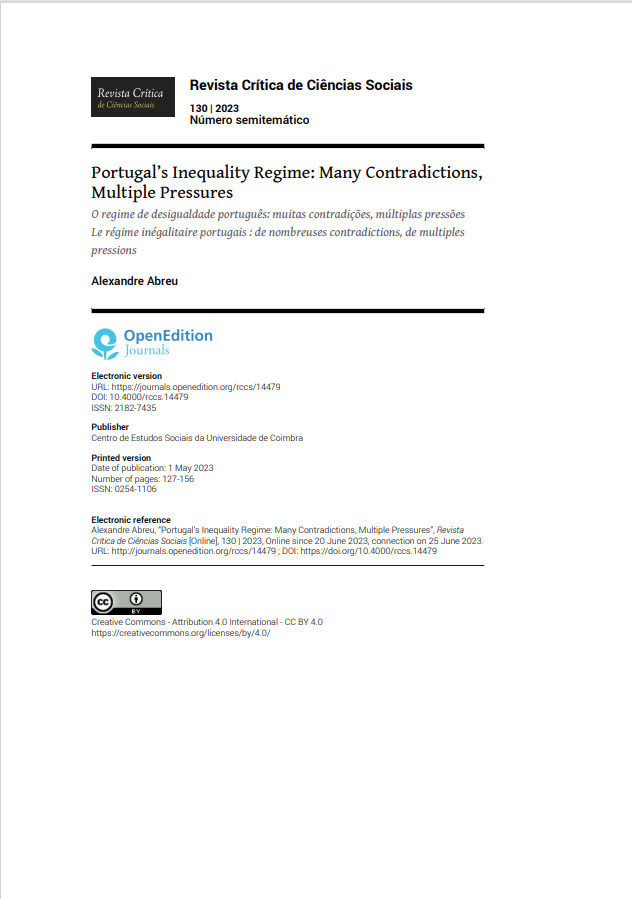
Portugal’s Inequality Regime: Many contradictions, multiple pressures
Abstract:
This paper applies the concept of inequality regime, in the tradition of the Regulation School, to the analysis of the patterns and drivers of socioeconomic inequality in Portugal in the last few decades. Key empirical patterns are identified with respect to income inequality, top and bottom incomes, wealth inequality, monetary poverty and non-commodified provision of basic goods. We then discuss several underlying processes and mechanisms, namely the capital-labour relation, classification struggles, financialisation, redistribution, and welfare, to account for the identified empirical patterns. We conclude that Portugal’s inequality regime is remarkably contradictory and argue that the country’s success in curbing most measures of inequality in recent times is especially vulnerable to a variety of pressures.
Quotation:
Abreu, A. (2023). “Portugal’s Inequality Regime: Many contradictions, multiple pressures”. Revista Crítica de Ciências Sociais, 130:127-156
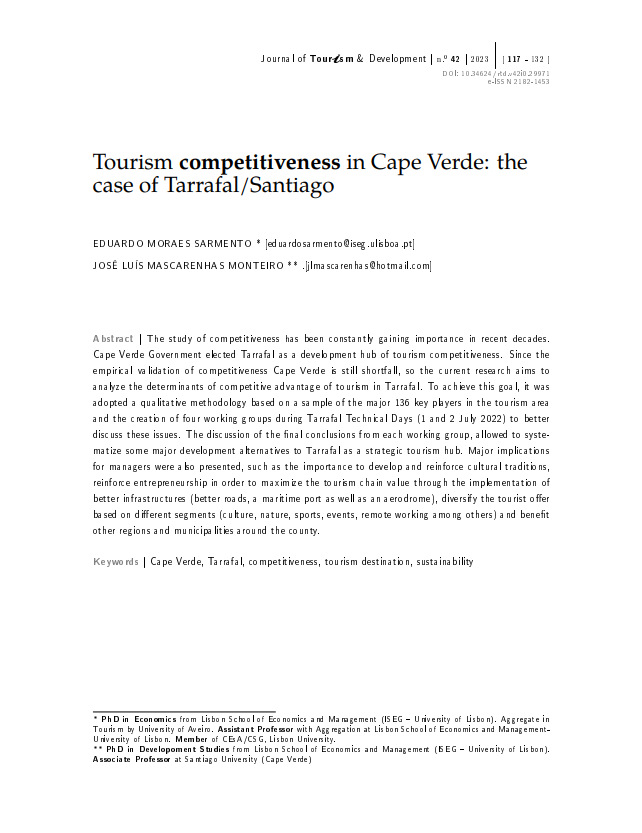
Tourism Competitiveness in Cape Verde: The case of Tarrafal/Santiago
Abstract:
The study of competitiveness has been constantly gaining importance in recent decades. Cape Verde Government elected Tarrafal as a development hub of tourism competitiveness. Since the empirical validation of competitiveness Cape Verde is still shortfall, so the current research aims to analyze the determinants of competitive advantage of tourism in Tarrafal. To achieve this goal, it was adopted a qualitative methodology based on a sample of the major 136 key players in the tourism area and the creation of four working groups during Tarrafal Technical Days (1 and 2 July 2022) to better discuss these issues. The discussion of the nal conclusions from each working group, allowed to systematize some major development alternatives to Tarrafal as a strategic tourism hub. Major implications for managers were also presented, such as the importance to develop and reinforce cultural traditions, reinforce entrepreneurship in order to maximize the tourism chain value through the implementation of better infrastructures (better roads, a maritime port as well as an aerodrome), diversify the tourist o er based on di erent segments (culture, nature, sports, events, remote working among others) and bene t other regions and municipalities around the county.
Quotation:
Sarmento, Eduardo Moraes e José Luís Mascarenhas Monteiro (2023). ” Tourism competitiveness in Cape Verde : the case of Tarrafal/Santiago”. Revista Turismo & Desenvolvimento, 42:117-132

Watch here the EADI CEsA Lisbon Conference 2023′ plenary sessions and open lectures
The largest European conference on Development Studies, the EADI CEsA Lisbon Conference 2023, took place from the 10th to the 13th of July, 2023 at ISEG. Plenary Sessions and Open Lectures are now available on the EADI – European Association of Development Research and Training Institutes YouTube channel (access here). Check them out:
Dudley Seers Lecture: Development Studies in an Age of Crisis, 10 de Julho, 18h (UTC+1), with Professor Doctor Alfredo Saad-Filho (King’s College London)
Kapuscinski Development Lecture: Soft Authoritarianism: Marching to a Different Drum of Democracy, 11 de Julho, 19h (UTC+1), with Professor Doctor Shalini Randeria (Central European University)
EADI CEsA Conference 2023 Opening Plenary: New paradigms in the struggles for Global Social Justice
EADI CEsA Conference 2023 Plenary: Países de língua portuguesa no 50º aniversário da independência
EADI CEsA Conference 2023 Closing Plenary: Development Studies in Turbulent Times
Read more:
Author: CEsA Communication (comunicacao@cesa.iseg.ulisboa.pt)
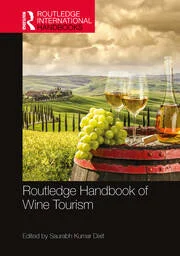
Exploring Co-creation Process in the Wineries: The relevance of social partner characteristics
Abstract:
In a global market, the exchange is regarded as one of the most important strategic resources that are critical for business company success (Hammervoll 2012; Johnson 1999; Powers and Reagan 2007). Hence, it is not a surprise that producers, distributors, retailers, customers, and even competitors join forces to co-create value solutions. With the business environment becoming more competitive, a dyadic perspective of buyer–seller relations is increasing. Partners should be concerned about joining forces and working together to improve their joint performance and add value to their offers (Cannon et al. 2010). In sum, the success of a company can be influenced by the style of the relationship that is developed with other players (Arranz and de Arroyabe 2012; Cunha, Loureiro, and Rego 2015a; Monteiro, Guerreiro and Loureiro 2019; Terpend and Ashenbaum 2012). Following this appeal for research, this chapter aims to explore how distributors and wine producers describe the personal and organizational social capabilities as facilitating facets of relationship quality (RQ) (it is an issue that depends on confidence, satisfaction, commitment, and trust). The wine sector is selected as a field of research because it has unique features which have not yet been deeply studied and could explain management specificities: 1 Portugal is an old wine country full of tradition and heritage, ‘in which the wine culture has been flourishing for centuries’ (Loureiro and Kaufmann 2012, p. 331). 2 The wine sector has not been deeply analyzed and studied in previous research. 3 This sector plays an important role in the national economy, and the recognition of the quality of the work carried out in this sector is being acclaimed internationally. This chapter is organized as follows: after this introduction of our topic research, we present the theoretical background that supported this study, followed by a description of the methodology. The following sections discuss research findings from the empirical study, and the implications for managers of this study are discussed. Finally, limitations and new research directions are suggested.
Quotation:
Sarmento, E. M, Loureiro, S. M. C., and Cunha, N. Exploring Co-creation Process in the Wineries: The relevance of social partner characteristics. In: Dixit, S.K. (Ed.). (2022). Routledge Handbook of Wine Tourism. Routledge. https://doi.org/10.4324/9781003143628
